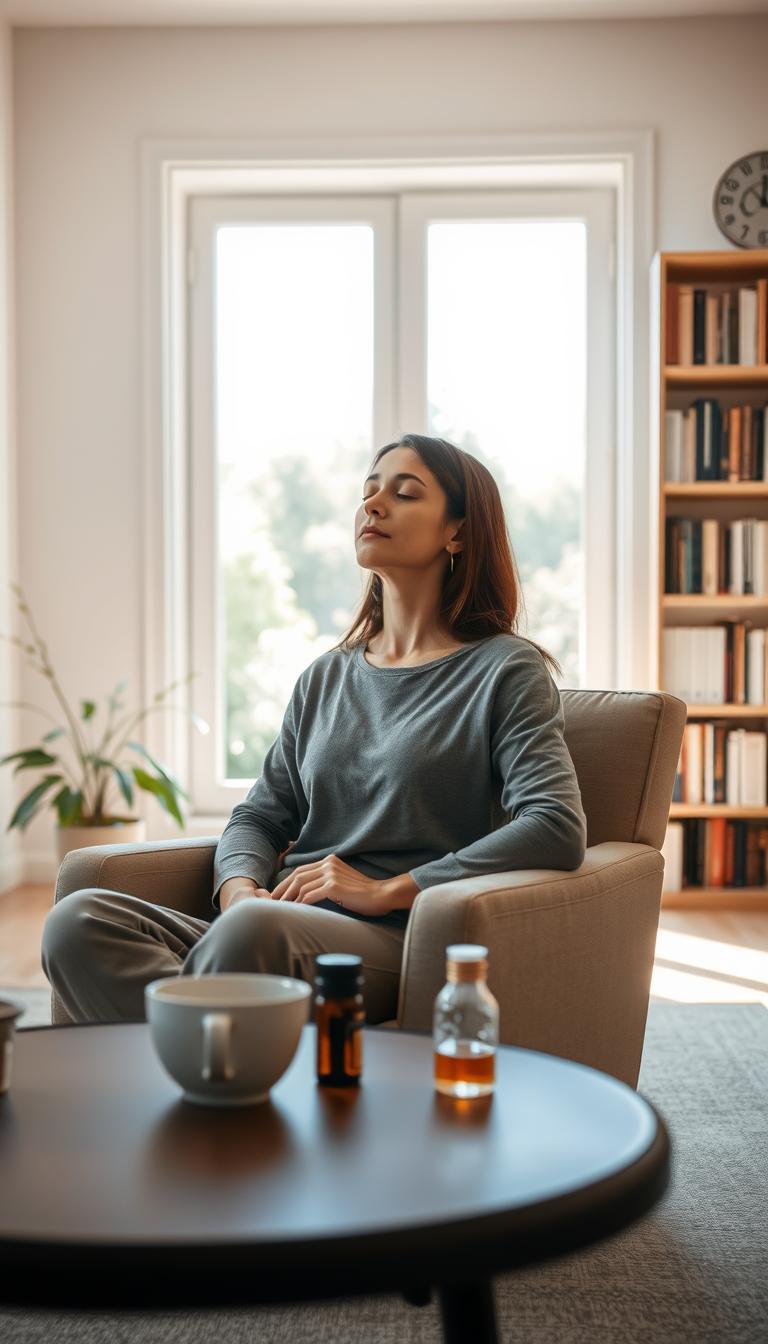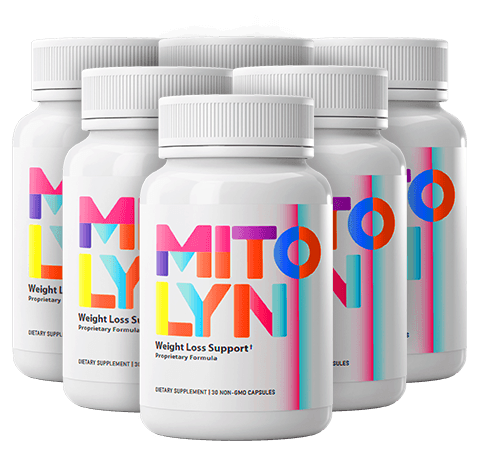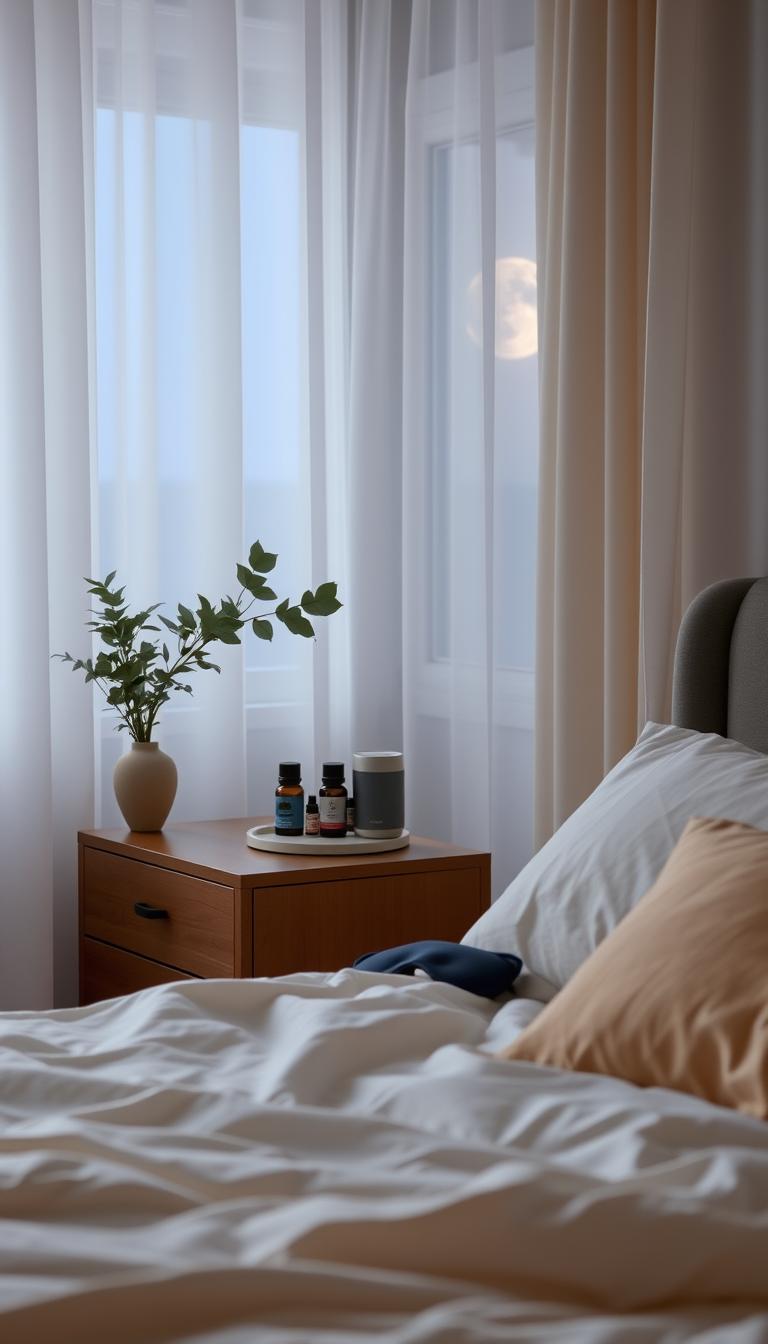
Imagine you’re rushing through a busy day. You’re juggling work, family, and more. Stress starts to build up in your mind and body. You’re not alone.
Depression rates have tripled in recent years. Modern life often leaves us with no time to pause. But what if small choices could change that?
Self-care is not a luxury—it’s a lifeline. Studies show it can lower anxiety and depression. It can also make you happier and strengthen relationships.
It’s about taking moments to pause and care for yourself. Maybe it’s a walk, a mindful meal, or journaling. Every moment counts.
Key Takeaways
- Small daily self care routines can reduce stress and improve mental health.
- Activities like exercise, sleep, and positive thinking directly impact your well-being.
- Self-care balances immediate joy (like a walk) with long-term habits (like yearly checkups).
- Setting boundaries and prioritizing rest builds resilience amid life’s chaos.
- Even brief routines—like a 5-minute mindful pause—add up over time.
Understanding the Importance of Self-Care in Modern Life
Self-care is not a luxury, it’s a must. The World Health Organization says it improves health and reduces stress. But many think it’s selfish. Let’s see why taking care of yourself is really important.
“The way I define self-care is the intentional, proactive pursuit of integrated wellness that balances mind, body, and spirit personally and professionally.”
Why Self-Care Isn’t Selfish
Doing self-care like meditation or exercise gives you energy. It helps you support others better. Studies show it makes work and relationships stronger.
More than 65% of adults ignore self-care, but it boosts productivity and emotional control. Taking care of yourself is not selfish. It’s about keeping yourself safe.
The Science Behind Self-Care and Wellbeing
Science backs up self-care. Activities like mindfulness reduce stress by 30% and improve focus. The WHO says walking 7,500 steps a day, eating whole foods, and sleeping well increase life span.
These habits make your mind and body strong. They help you bounce back from challenges.
Signs You Need More Self-Care in Your Life
Look out for these signs:
- Constant fatigue or frequent illness
- Irritability or feeling overwhelmed
- Poor focus or social withdrawal
If you see self-care as a luxury, it’s time to change your mind. Neglecting your body, like skipping meals or not sleeping well, means you need a break.
Seeing these signs? It’s time to start routines that help you. Small steps today are the start of a better life.
Morning Self-Care Routines to Start Your Day Right
Starting your day with purpose is key to a balanced life. Even small habits in the morning can make a big difference. Daily self care doesn’t need to take up a lot of time. It’s about choosing actions that nourish your mind and body early on.
These routines can change your mornings into a strong foundation for success.
Five-Minute Morning Rituals Anyone Can Do
Start with quick, impactful habits to kickstart your day. Try these ideas:
- Hydrate first: Drink a glass of water to rehydrate after sleep. Studies show this combats dehydration caused by overnight rest.
- Write morning pages: Julia Cameron’s “The Artist’s Way” recommends 3 pages of free-writing to clear mental clutter.
- Set intentions: Say 1-2 affirmations aloud, like “Today I will listen to my needs.”
- Mindful breathing: Inhale for 4 counts, hold, exhale for 6. Repeat 5 times to calm your nervous system.
“Morning rituals build momentum,” says clinical psychologist Ryan Howes, Ph.D. “They anchor your day in self-awareness.”
Mindful Breakfast Practices
Breakfast becomes a self care practice when you slow down. Try:
- Sit at a table instead of multitasking. Notice the taste and texture of each bite.
- Add a vitamin C-rich fruit—like oranges—to boost immunity while you eat.
- Pair your meal with a 5-minute gratitude reflection.
Research shows 35.2% of U.S. adults are sleep-deprived. A mindful breakfast helps reset after restless nights.
Movement and Stretching to Energize Your Body
Movement primes your body for the day. Try this 3-move stretch routine:
| Move | How | Why |
|---|---|---|
| Cat-Cow Stretch | Arch and round spine on hands and knees | Loosens tight back muscles |
| Leg Swings | Stand and swing legs forward/backward 10x each side | Warms up joints |
| Arm Circles | Extend arms and make circles 10x forward/backward | Improves shoulder mobility |
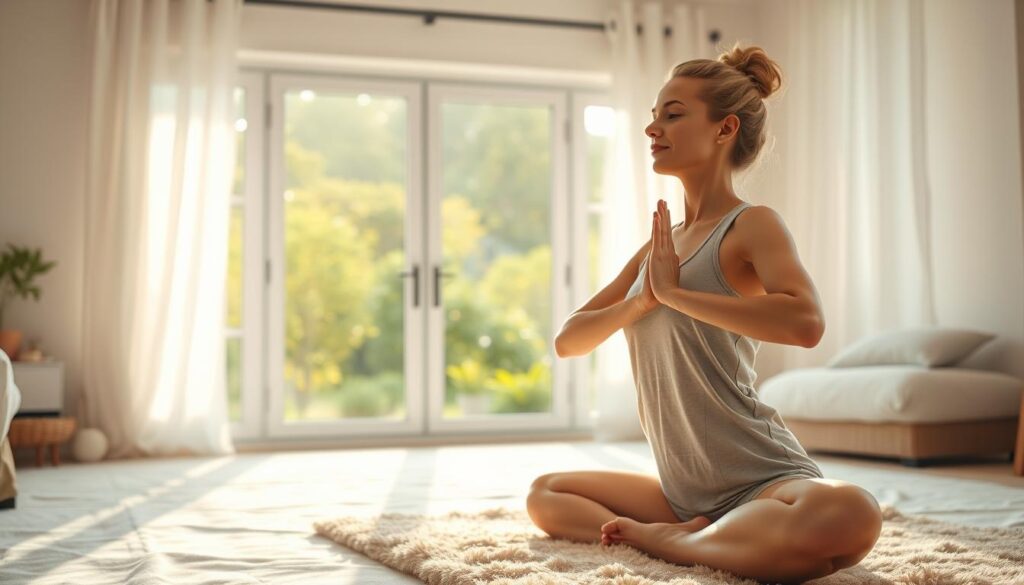
Retired Navy admiral William H. McRaven advises starting with small wins like making your bed. This tiny ritual builds momentum for the day. Studies show morning movement reduces stress hormones, helping you tackle tasks with clarity.
Incorporate these self care routines into your daily self care to build resilience. Every small choice adds up—begin with one habit and let it grow naturally.
Essential Self-Care Routines for Mental Health
Protecting your mental health takes effort. During the pandemic, depression rates tripled. This makes mental health self care more important than ever. Simple routines can fight stress and build strength.

Begin with daily mindfulness: just 5 minutes of meditation can cut stress by 30%. Journaling helps you deal with feelings. Puzzles or reading keep your mind active. Self love practices like affirmations and kindness replace negative thoughts.
- Set boundaries: Learn to say no to avoid burnout
- Connect with nature: Studies show outdoor time lowers anxiety and fatigue
- Share feelings: Talk with a trusted friend to manage emotions
- Practice gratitude: Note 3 things you’re thankful for daily
Emotional health grows when you care for yourself. 64% of Americans feel more confident with self-care. And 71% say they’re happier. Make sure to sleep well (7–9 hours), move, and eat healthy foods to boost mood.
Small steps are key. Pick one routine today—like deep breathing, a walk, or checking in with your feelings. It’s the regular effort, not being perfect, that helps your mental health.
Physical Self-Care Activities to Revitalize Your Body
Physical self-care is more than just going to the gym. It’s about making choices every day that help your body and mind. Simple things like short walks or stretching can make you feel more energetic and happy. Eating well and getting enough sleep are also key to feeling your best.
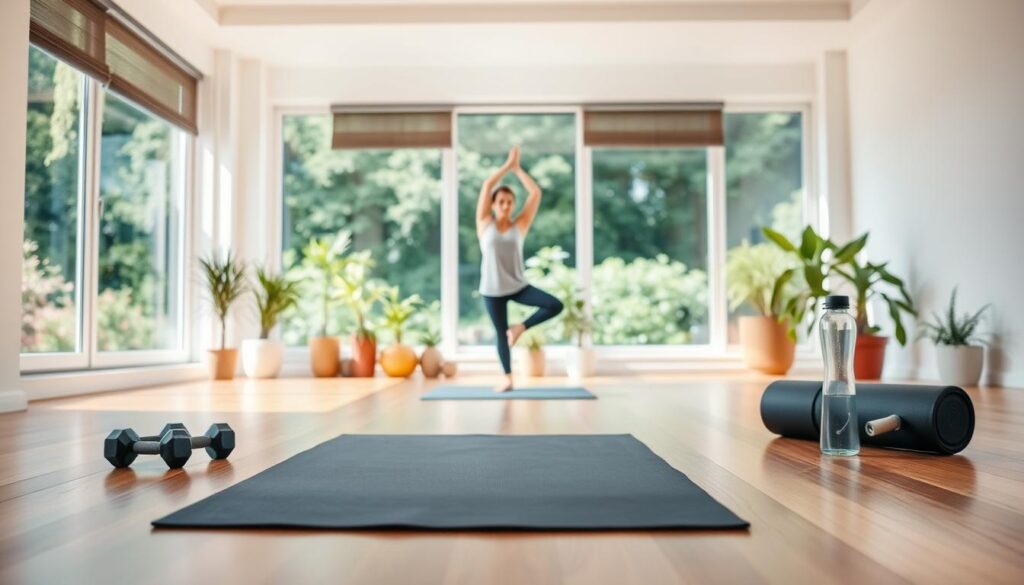
Begin with self care activities that fit your life. Try doing 10–15 minutes of exercises like squats, lunges, or push-ups every day. Use things around your house, like chairs or water bottles, as weights. A 20-minute walk after dinner can help your blood flow and digestion.
Dancing while you cook is also good. It makes you feel happy because it releases special chemicals in your brain.
- Strength Training at Home: Do bicep curls with dumbbells during TV breaks. Two sets of 12 reps twice a week build muscle and bone strength.
- Nutrition as Nourishment: Plan meals around whole foods. Prep a week’s worth of veggies on Sunday. Opt for salads with lean proteins and healthy fats to fuel your days.
- Sleep Hygiene Basics: Stick to a consistent bedtime. Dim lights an hour before bed and avoid screens. A 30-minute wind-down routine—like reading or deep breathing—preps your body for rest.
Sleep makes you 30% more productive, and eating well lowers heart disease risk. Small changes can make a big difference. A 15-minute walk, a mindful meal, or a 20-minute stretch session can help. Make these self care routines a part of your daily life. Your body will thank you when you move, eat well, and rest well.
Creating Effective Self-Care Habits That Last
Building lasting self care habits doesn’t need big changes. Start with small, steady steps. Studies say it takes about two months to form habits, so be patient.
Link new habits to things you already do. One person found success by stretching for 2 minutes while making coffee. Start small today.
Start now. Take baby steps, but start today.
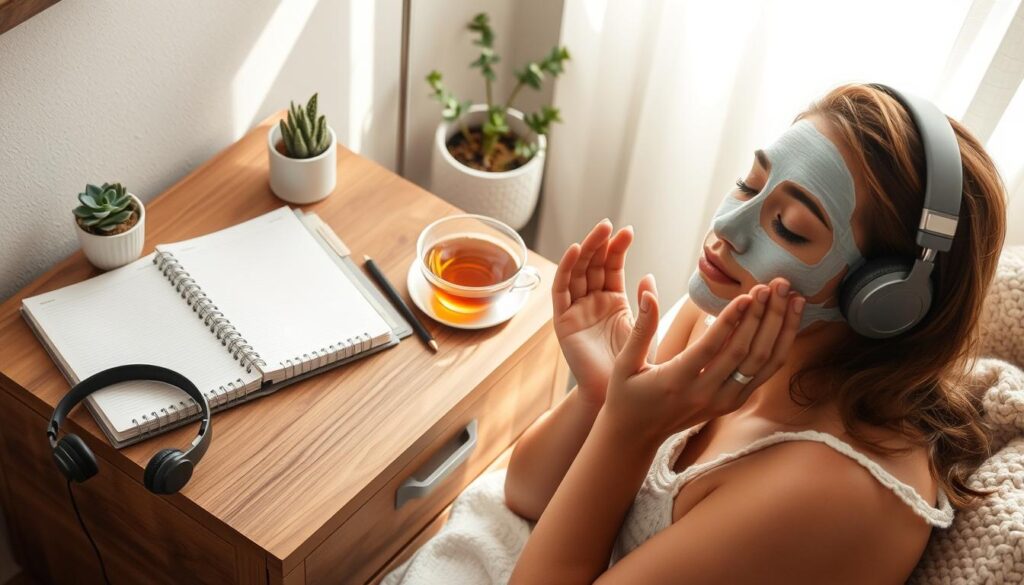
Habit Stacking: Connecting Self-Care to Existing Routines
Make daily tasks into self-care moments. Try:
- Meditate for 3 minutes after brushing your teeth
- Do 5 push-ups while waiting for water to boil
- Write one gratitude note before bed
Link new habits to things you already do. Over time, they become second nature.
Tracking Progress Without Obsession
Keep track of your wins without feeling stressed. Use apps like Streaks or a journal. Celebrate every small success.
A 2021 study showed 10 minutes of mindfulness each day can reduce burnout. It’s okay to miss a day sometimes.
Overcoming Common Self-Care Obstacles
Feeling short on time? Start with 5-minute exercises. Feeling guilty? Remember, self-care helps you help others.
Don’t aim for perfection. Adjust your routines as needed. Over 30 states now support mental health days. Having friends join you can keep you going.
Self-care is a journey, not a to-do list. Begin with small steps. Your well-being is about being consistent, not perfect.
Quick Self-Care Ideas for Busy People
Even the busiest days can include moments of care. These self care ideas take minutes but offer real benefits. Try these bite-sized self care activities that fit into your routine.
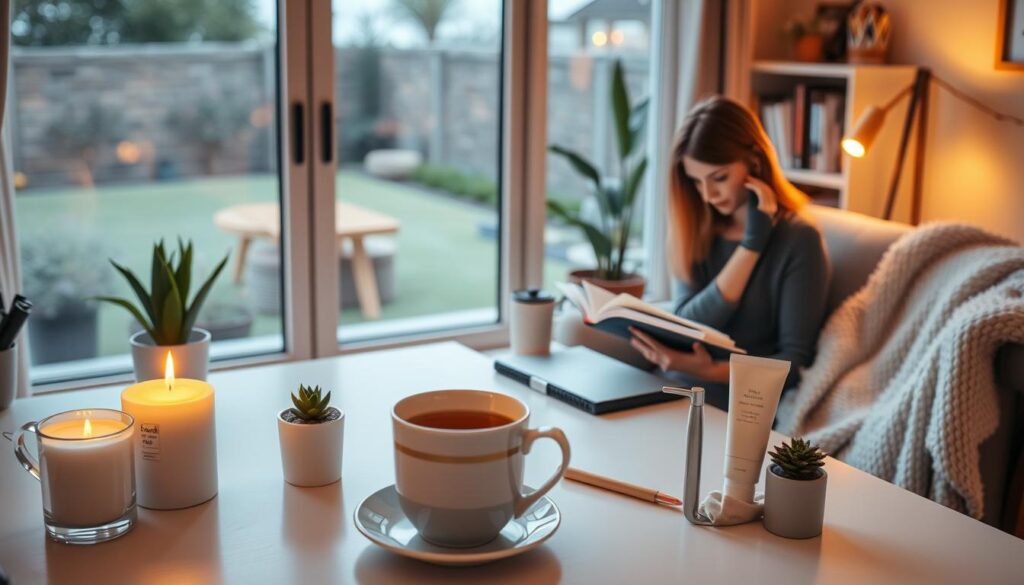
Physical touch like hugs can reduce stress hormones and improve well-being, according to recent studies.
Start small—every action counts. Here’s how to sneak wellness into your day:
- Step outside for fresh air: Sunlight and nature reset your mood in 5 minutes.
- Write down three things you’re grateful for daily—this practice lowers stress over time.
- Stretch while waiting: Desk shoulder rolls or calf stretches ease tension in 60 seconds.
| Activity | Why It Helps | Time Needed |
|---|---|---|
| Deep breathing | Activates your relaxation response | 1-2 minutes |
| Phone break | Reduces screen fatigue | 10 minutes |
| Quick walk | Boosts energy and focus | 10-15 minutes |
Even a 2-minute pet cuddle or a 30-second smile in the mirror counts. Self care isn’t about perfection—it’s about progress. Make time for these micro-moments to build resilience.
Building a Personalized Self-Care Checklist
Just because a behavior is “good for you” doesn’t make it self-care. Choose practices you genuinely enjoy.
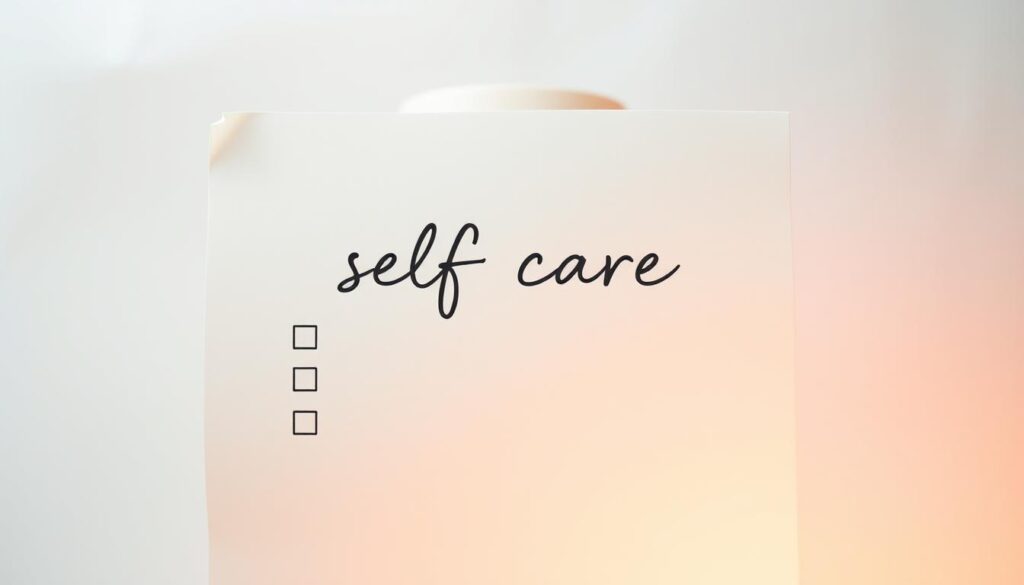
Make your self care checklist by picking activities that fit you. Start with daily things that match your values:
Daily Self-Care Essentials
- Drink water all day
- Do 10 minutes of mindful breathing or stretching
- Don’t use screens before bed to sleep better
Weekly Self-Care Practices
Deepen your routine with these weekly commitments:
- Walk outside for 30 minutes (CDC says 150 minutes a week)
- Do something social (like have coffee with a friend)
- Write in a journal for 15 minutes to track your feelings and goals
Monthly Self-Love Rituals
Recharge with intentional self love practices:
- Take a full day without digital devices
- Write three things you like about yourself
- Do something creative (like painting, cooking, or gardening)
| Category | Activity | Timeframe | Benefits |
|---|---|---|---|
| Physical | Hydration tracking | Daily | Improved energy levels |
| Mental | Mindfulness meditation | Weekly | Reduced stress (NIMH data) |
| Emotional | Gratitude journaling | Monthly | 25% well-being boost (research cited) |
Make this plan fit your life. Self-care isn’t for everyone. Try new things and see what makes you feel good. Small daily habits and big monthly rituals help build a good self care checklist. Choose activities that make you feel good, not just because you should.
Digital Detox: The Overlooked Self-Care Practice
Think about how much time you spend on screens. Now, imagine using that time for self care ideas that help your mind. Digital detox isn’t about giving up tech forever. It’s about setting limits to keep your mind healthy.
More than 20% of students spend over five hours a day on social media. This can lead to more depression.
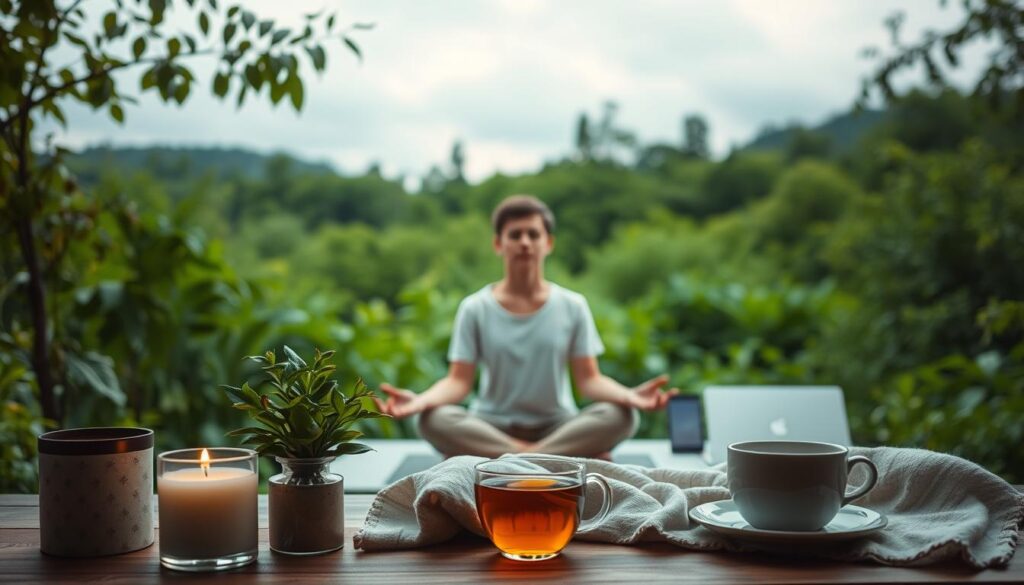
Turn off your phone. Resist the urge to check devices first thing in the morning. Start your day with intention instead of notifications.
Make some areas phone-free, like the dinner table or bedroom. Use built-in timers to track your screen time. Here are some quick tips:
- Switch to a physical alarm clock to avoid morning scrolling
- Set “tech curfews” by charging devices outside the bedroom at night
- Replace 30 minutes of scrolling with a walk, journaling, or face-to face chats
Studies show cutting social media to 30 minutes daily can reduce depression. Even short breaks, like a weekend detox, can help. Feeling anxious without your phone? You’re not alone: 30% of adults report withdrawal. But remember, your mental health self care is more important than FOMO.
Start small. Swap one screen hour for a walk, a book, or a call with a friend. Your brain and mood will thank you.
Conclusion: Embracing Self-Care as a Lifestyle, Not a Luxury
Self-care is about making progress, not being perfect. Every small action, like stretching or taking a deep breath, helps. This article showed how routines, from morning stretches to digital detoxes, balance your health.
Self-care isn’t selfish. It’s what keeps you going in life. Activities like walking, journaling, or setting work boundaries help you deal with stress. SAMHSA’s eight wellness areas show that caring for yourself is key.
Some think they can’t afford or find time for self-care. But even simple things like breathing deeply or enjoying a cup of tea help. Making time for rest or turning off screens is important. Small changes, like meditating for five minutes or sleeping an hour more, make a big difference over time.
Begin today. Pick one habit, like going for a walk, enjoying a quiet coffee, or having a tech-free evening. Over time, these actions become habits that improve your energy, focus, and mood. When you take care of yourself, you can better support others. This builds stronger relationships and a healthier community.








